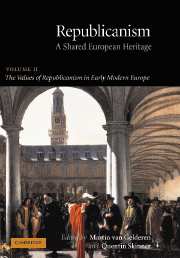Book contents
- Frontmatter
- Contents
- Contents of Volume I
- Acknowledgments
- Introduction
- Part I Republicanism and Political Values
- 1 Classical Liberty and the Coming of the English Civil War
- 2 Empire and Liberty: A Republican Dilemma
- 3 Republicanism and Toleration
- 4 The Mechanisation of Virtue: Republican Rituals in Italian Political Thought in the Sixteenth and Seventeenth Centuries
- 5 From Virtue to Politeness
- 6 From Civism to Civility: D'Holbach's Critique of Republican Virtue
- Part II The Place of Women in the Republic
- Part III Republicanism and the Rise of Commerce
- Bibliography
- Contributors
- Index of Names of Persons
- Index of Subjects
2 - Empire and Liberty: A Republican Dilemma
Published online by Cambridge University Press: 11 January 2010
- Frontmatter
- Contents
- Contents of Volume I
- Acknowledgments
- Introduction
- Part I Republicanism and Political Values
- 1 Classical Liberty and the Coming of the English Civil War
- 2 Empire and Liberty: A Republican Dilemma
- 3 Republicanism and Toleration
- 4 The Mechanisation of Virtue: Republican Rituals in Italian Political Thought in the Sixteenth and Seventeenth Centuries
- 5 From Virtue to Politeness
- 6 From Civism to Civility: D'Holbach's Critique of Republican Virtue
- Part II The Place of Women in the Republic
- Part III Republicanism and the Rise of Commerce
- Bibliography
- Contributors
- Index of Names of Persons
- Index of Subjects
Summary
At the heart of the shared European heritage of republicanism lay a tension between the competing demands of two overwhelmingly desirable but ultimately irreconcilable goals: liberty and greatness. History showed that liberty gave birth to republics and that republics strove to safeguard that liberty both internally, for the flourishing of their citizens, and externally, for the security and grandeur of the republic itself. Theory reinforced the historical connection between republican government and liberty. The commitment to liberty under the law, but liberty with responsibility for the collective well-being of the community, has distinguished the republican tradition from its classical origins through to its contemporary revival (Pettit 1993: 164–9; 1997: 35–41). Though the Machiavellian branch of the early-modern republican tradition affirmed this central commitment to liberty, it insisted equally strongly on the primacy of greatness (grandezza) in defining the character of the commonwealth. There was nothing novel in either of these commitments, as Quentin Skinner has shown, for both can be found in the prescriptive writings on civil life produced in medieval Italy. Seen from the perspective of thirteenth- and early fourteenth-century republicanism, Machiavelli's defence of the two propositions ‘that no city can ever attain greatness unless it upholds a free way of life’ and that ‘no city can ever uphold a free way of life unless it maintains a republican constitution’ appears to be ‘a wholehearted defence of traditional values’ presented ‘in a wholeheartedly traditional way’ (Skinner 1990c: 141).
- Type
- Chapter
- Information
- RepublicanismA Shared European Heritage, pp. 29 - 46Publisher: Cambridge University PressPrint publication year: 2002
- 19
- Cited by



